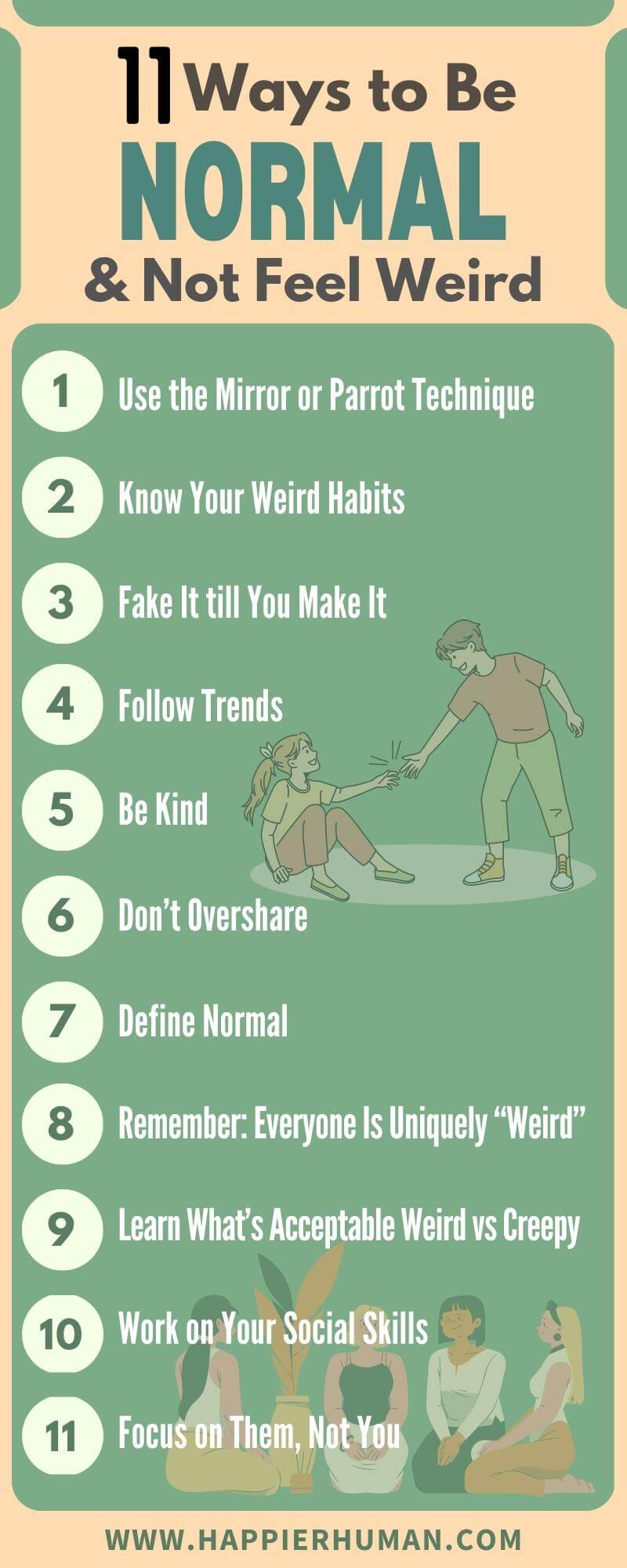Feeling out of place or like you don’t quite fit the mold can be a challenging and isolating experience. But here’s the truth—everyone feels a little “weird” at times! It’s part of being human.
Whether you're navigating social interactions, trying to avoid awkward moments, or simply questioning what “normal” even means, it's completely natural to seek balance between individuality and fitting in.
That’s why we’ve created this guide on 11 Ways to Be Normal & Not Feel Weird.
From practical tips like using the “Mirror or Parrot Technique” to redefining your idea of normal, this article will help you feel more confident in social settings and in your own skin.
Keep reading to discover how small adjustments in mindset and behavior can lead to big changes, and why accepting your unique self is the ultimate secret to feeling truly connected.
What Does It Mean to Be “Normal”?
Being normal should mean being your authentic self, as everyone is unique.
However, in practice, “normal” often refers to conforming to societal expectations, fitting into predefined categories, and displaying common behaviors or traits. These standards vary widely across cultures, families, and social groups, making “normal” subjective and context-dependent.
Actions, beliefs, and identities deviating from the majority are often labeled strange, even though they reflect individual differences.
Additionally, societal norms often marginalize those with physical or mental health conditions despite such conditions being a standard part of human diversity.
Ultimately, there is no universal definition of normal, so finding your sense of normalcy is what truly matters.
Why Do I Feel Weird?
Feeling “weird” is a subjective experience unique to each individual. It’s often just a feeling, not a fact, and can stem from various reasons.
If you’re having an off day and feeling strange, it’s likely due to temporary circumstances like life changes, stress, or side effects from medication. On the other hand, if you’ve always felt different, it may simply mean you don’t align with the “norm,” whatever that might be, and there is nothing wrong with that!
If you feel “weird” ou may:
11 Ways on How to Be Normal
I want you to know that there is absolutely nothing wrong with you if you don't fit in with the norms. You don’t need to change who you are just so others may like you.
A.J. Downy said it best: “When you find people who not only tolerate your quirks but celebrate them with glad cries of “Me too!” be sure to cherish them. Because those weirdos are your tribe.”
However, acting normally can make your life easier and more tolerable, so here’s how.
Tip 1. Use the Mirror or Parrot Technique
One way you can seem to be more regular, especially in social situations, is to mirror or parrot what you see. You don’t want to come across as even weirder, so you must be subtle about this.
Movies and TV shows usually tell us what is acceptable and what isn’t so we can practice acceptable behavior in front of a mirror. Don’t over-rehearse because that will come across as strange, too. But do practice so you feel more comfortable.
You can also people-watch while you ride the train or bus, eat lunch at the park, or sip coffee at your local java joint. Make mental notes (or journal) about what’s expected in various situations, and then use what you learn to appear normal.
Tip 2. Know Your Weird Habits
Maybe you speak in a different accent or like Yoda when you feel shy and nervous? Do you tell eccentric jokes to make conversation? Or maybe you stop blinking or have some other weird tell(s)?
Whenever we need to solve a problem, we first need to understand what the issue is. Not that being weird is a problem that needs solving, but you can only work on your weird habits if you know what they are and why they are strange to others.
So be mindful of when someone gives you weird looks or says something about you being an oddball. What did you do that triggered that reaction from them? Then, work on changing your strange habit so you can fit in better.
Tip 3. Fake It till You Make It
My dad always told me to “fake it till I make it” to get me to be more “normal.” I hated this expression (and still do) because it feels like you aren’t being authentic when you present a fake you to the world.
In recent years, I have seen the value of faking it, but I know I can still be me and just fake it when necessary to get through certain social situations.
So, I try to adopt a “normal persona” so the other person or people can take me seriously, listen to what I have to say, or accept me for whatever reason—be it at the doctor’s, a job interview, or (#cringe) a social outing I can’t avoid.
When you fake it, you don’t pretend to be someone you aren’t. You are simply finding the more serious and normal aspects of your personality to help you when needed. It can be exhausting acting “normal” always, so choose carefully when you put on the normal persona.
Tip 4. Follow Trends
Normal people like to follow the trends to be in with the in-crowd. This helps them feel like they belong and that they are normal. So that’s what you need to do too – follow what is trending on the runway, in the movie theater, on TV, and on streaming services, and on the internet and social media.
If you know that The Witcher is trending on Wednesday, then make time to watch the show. It’ll make engaging in conversation with your family, colleagues, or acquaintances easier.
I only read The Hunger Games because it was trending way back then, and it helped me have conversations with my colleagues.
Tip 5. Be Kind
“In a world where you can be anything, be kind.” ~ Unknown.
You can be weird, but when you are kind, that’s what people will notice and remember about you. Being kind will also help you fit in, and don’t think you can get away with being fake nice. People will notice that too.
So do random acts of kindness, genuinely smile at people, write thank you cards, help where you can listen mindfully, and be kind in any way you can.
Tip 6. Don’t Overshare
Weird people sometimes overshare, making others even more aware of their weirdness and why they are not normal. Maybe you keep a lot bottled up inside, or maybe you crave social interaction because you are lonely.
No matter the reason, you don’t want to draw attention to your weirdness.
When you want to seem normal, keep your weirdness to yourself and your trusted inner circle and don’t tell others about your weird dreams, unique outlook on death, or why you believe we are robots and should praise a certain alien deity.
So, keep details on the down-low and to a minimum. Protecting yourself and your personal information is best because you don’t know whether you can trust the other person.
If you want to see if you can trust them, share a small, weird tidbit and see how they react. Don’t drown them by oversharing; oversharing is simply not cool.
Tip 7. Define Normal
“Being normal” doesn’t mean the same to you as it means to me. You need to determine what normalcy is depending on where you live, who your family and friends are, where you work, and your faith, ethnicity, and culture.
Normal could mean:
So, when you understand your weird habits, you can define what it means to be normal and then work on it.
Tip 8. Remember: Everyone Is Uniquely “Weird”
Yip, this is 100% true. Normal is overrated, and people just seem like they are normal because they are good little sheeple who follow the flock leader – whether that’s society at large or someone who has power and influence.

When people become self-aware and accept themselves for who they truly are, they’ll realize they are weirdos, too. Most people are insecure about many things in their lives. They, too, follow the masses so they can seem like they are normal.
Did you know that feeling weird and wondering how to be normal is quite normal and more common than you probably think?
People aren’t as concerned about your weirdness as you may think they are. Most people are inherently self-absorbed and preoccupied with their own life and dramas.
So, ask a trusted friend or colleague how weird you are. Be specific and let them know what you are trying to understand, and then notice everyone else’s quirks and how un-normal they are.
Tip 9. Learn What’s Acceptable Weird vs Creepy
There’s a vast difference between being weird and being obnoxious or creepy. The first is more acceptable, and you may get a few odd looks or comments here and there.
But generally, this normal kind of weirdness, awkwardness, uniqueness, unusualness, or quirkiness isn’t something you should spend a lot of time overthinking or worrying about.
Now, if you fall in the latter category, where you are just plain creepy weird, then it’s a problem. People who are normal and weird don’t push social boundaries, whereas those who are obnoxious and/or creepy do.
If you come across as creepy, you need to work on your social skills and learn to be more normal.
Tip 10. Work on Your Social Skills
Most of the time, when you feel weird, you are probably just socially awkward. You don’t feel like you belong in social situations.
It’s uncomfortable and unpleasant, and you may wish a magical portal would open up, swallow you whole, and spit you out anywhere other than where there are other people.
Having social anxiety, you overthink social situations. You worry about saying the wrong and right things and what people think of you. And you feel super self-conscious.
So, to feel more normal and less socially anxious, you need to work on your social skills so you can fit in better when you are among a group of people.
You may need to talk with a therapist, practice smiling, learn to listen actively and mindfully, move out of your comfort bubble, and initiate and participate in conversations.
Set one socializing goal and work on it. Once you feel like you are starting to master it, incorporate another until you feel comfier and more normal in social situations and not entirely out of your depth.
Do you wonder if you have social anxiety? Why not take one of these social anxiety tests and find out.
Tip 11. Focus on Them, Not You
Divert your attention away from how weird you are feeling and focus on the other person. When you are hyper-focused on yourself and your awkwardness or quirky personality traits, you will feel even more left out and alienated.
So, focus on them, not you. You can become an active and empathic listener, ask open-ended questions so the person needs to answer in a sentence or 5 instead of just a short “yes” or “no,” and engage in their interests.
Learn open body language, smile, and make eye contact so the person you are talking to feels like they are the focus of your attention.
Why Is It Important to Accept Yourself for Who You Are?
“When you accept yourself, you are freed from the burden of needing others to accept you. Don’t allow anyone or anything to control, limit, repress, or discourage you from being your true self.” ~ Steve Maraboli
You must learn to accept yourself for who you are, quirks and all. You are imperfectly perfect and perfectly imperfect – just as you are.
And you are enough.
There are various benefits to learning self-acceptance and self-love:
Final Thoughts on How to Be Normal
Everyone is unique, and you aren’t the freak show you or others may think you are. There are benefits to learning self-love, self-awareness, and self-acceptance, but there’s also value in navigating life and making things easier for yourself by learning how to be normal.
Remember that pretending to be who you aren’t won’t get you far. Instead, focus on learning communication and social skills, defining what’s normal for you, using the mirror technique to teach yourself to be more normal… and always be kind.
After all, your weirdness makes you unique and is part of who you are, and there’s nothing wrong with that.
Learn more ways to accept yourself by practicing self-love with these 8 self-love exercises.
Check out a few more related posts from HappierHuman:
- Fake Your Happiness on Social Media? Here's Why NOT
- 7 Steps to Make Friends Online Without Making It Weird
- 19 Weird Things That Narcissists Do to Manipulate People


